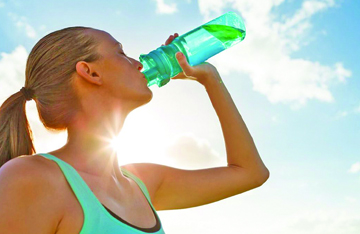by Parker Grissom
School is out and summer is here! The warm weather makes us all want to get outside, and when we do it’s important to stay safe. These tips can help!
Stay Hydrated
We can’t say it enough: The rule of summer is to hydrate. But it’s not always the best bet to aim for eight 8-ounce glasses a day. Runner’s World reports that recommended amounts are actually 91 ounces a day for women and 120 ounces for men. That said, people vary in their activity levels and “sweat rates,” so it is pretty safe to let thirst be your guide.

The following are other important things to know about hydrating.
Sometimes water isn’t enough. Water is necessary for every metabolic process of the body, as it transports nutrients and removes waste. However, if you go for a long run or are out in the heat all day, you may need a drink with enhanced electrolytes that can prevent your body from losing sodium.
Water won’t keep you cool. Speaking of heat, it’s also important to recognize that hydration alone cannot ward off the risk of heat stroke. While dehydration can make you more prone to it, factors like exercise intensity, humidity and air temperature can all contribute.
Don’t drink too much. Finally, while it is rare, it is possible to drink too much, which can result in a condition called hyponatremia. When this happens, the increased fluid intake combines with increased sweating, causing sodium levels in the blood to become dangerously low. To prevent this, again it’s best to let thirst be your guide and don’t overdo it.
Get The Right Gear
As you set out for Colorado’s playground, another tip to keep in mind is equipment and clothing. In addition to outfitting yourself for your favorite outdoor pastime, whether it is hiking, biking, running, or camping, you also have to factor in the season’s challenges surrounding altitude, wildlife and quick weather changes.
The best bet here is to get quality advice you trust. Do your research and talk to others who know the ropes. This is especially important when it comes to evaluating “trends” in fitness such as barefoot running. Some experts say that exercising without shoes makes it possible to absorb negative electrons from the earth through the soles of the feet, which can be an antioxidant and have an anti-inflammatory impact on the body. It also can improve foot position, balance and body awareness.
At the same time, other experts caution that barefoot walking and exercising can come with increased risk. Lack of strength in the foot can reveal poor walking mechanics, which can lead to injury. Barefoot exercisers are also susceptible to injury from rough or wet terrain, cold temperatures and sharp objects on the ground.
Bottom line: It’s important to seek wise advice and use your best judgment. Know what’s a trend in fitness and what makes sense for your lifestyle.
Remember The Sunscreen
A final way to stay safe — and another reason to use your best judgment — is in regard to sunscreen. Recent reports have made us second-guess ourselves and wonder whether all the sun protection could be doing more harm than good. Harvard Medical School addresses some common misperceptions: Does sunscreen cause skin cancer? (It doesn’t!) Does sunscreen prevent the three main types of skin cancer? (It does!). And is sunscreen actually poisonous to people? (It isn’t!)
The reality is that Colorado has more than 300 days of sunshine a year, and reports show risk of skin cancer goes up with altitude, so sunscreen is essential. Harvard Medical School also recommends avoiding sun exposure when possible, wearing sun-protective clothing, and reapplying sunscreen every two hours.
Parker’s purpose on earth is to make every person he meets happier and healthier. With a degree in Exercise Science from University of North Carolina at Wilmington, Parker achieves this purpose through group fitness, personal training, and motivational speaking.
